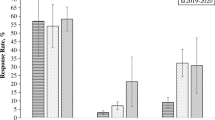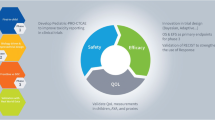Abstract
Introduction
Tremendous improvement in the overall survival of pediatric cancer patients has occurred over the past 40 years, but this may be slowing down. Continued progress depends on the development of new drugs and their prompt evaluation in clinical trials.
Objective
Because of a perceived increase due to a greater number of drugs in development in adult oncology clinical trials, we examined recent trends and outcomes of early-phase clinical trials conducted in pediatric oncology.
Methods
We conducted a literature review using PubMed and examined articles between January 2005 and December 2010. Inclusion criteria consisted of (1) reports published in English, (2) trials conducted exclusively in the United States or Canada, and (3) enrollment of patients under the age of 22 years. Excluded were trials evaluating radiation therapy, stem cell transplantation, supportive care, and therapies for non-oncologic diseases.
Results
We identified 75 early-phase trials, 64 drug and 11 immunotherapy, involving 2,286 patients below the age of 22 years. Complete or partial responses were observed for 5 % (phase I) and 19 % (phase II) of patients. Study-associated deaths occurred in 5 % (phase I) and 20 % (phase II) of patients. Progressive disease accounted for the vast majority of these deaths, followed by infection. Only two of the 43 phase I and none of the 11 phase II studies were sponsored solely by industry. Time to complete enrollment was 29 ± 14 and 49 ± 20 months for pediatric phase I and II drug studies, respectively. Pediatric early-phase drug trials demonstrated efficacy with low toxic death rates. Pediatric trials, including immunotherapy trials, showed less industrial support and longer phase II enrollment times than adult trials. Between 1990 and 2010, adult trials increased linearly, while growth in pediatric trials was flat. Only three of the drugs approved by the FDA between 2000 and 2010 were also approved for pediatrics.
Conclusions
Published pediatric oncology early-phase trials have not shown the same linear increase as adult trials. We have identified differences in sponsorship and longer enrollment times for phase II trials.



Similar content being viewed by others
References
Craft AW. Childhood cancer—mainly curable so where next? Acta Paediatr. 2000;89(4):386–92 2000/06/01.
Vassal G, Zwaan CM, Ashley D, Le Deley MC, Hargrave D, Blanc P, et al. New drugs for children and adolescents with cancer: the need for novel development pathways. Lancet Oncol. 2013;14(3):e117–24.
Druker BJ, Talpaz M, Resta DJ, Peng B, Buchdunger E, Ford JM, et al. Efficacy and safety of a specific inhibitor of the BCR-ABL tyrosine kinase in chronic myeloid leukemia. New Engl J Med. 2001;344(14):1031–7.
Dubowy R, Graham M, Hakami N, Kletzel M, Mahoney D, Newman E, et al. Sequential oral hydroxyurea and intravenous cytosine arabinoside in refractory childhood acute leukemia: a pediatric oncology group phase 1 study. J Pediatr Hematol Oncol. 2008;30(5):353–7 2008/05/07.
Souid AK, Dubowy RL, Ingle AM, Conlan MG, Sun J, Blaney SM, et al. A pediatric phase I trial and pharmacokinetic study of ispinesib: a Children’s Oncology Group phase I consortium study. Pediatr Blood Cancer. 2010;55(7):1323–8 2010/08/17.
Horton TM, Blaney SM, Langevin AM, Kuhn J, Kamen B, Berg SL, et al. Phase I trial and pharmacokinetic study of raltitrexed in children with recurrent or refractory leukemia: a pediatric oncology group study. Clin Cancer Res. 2005;11(5):1884–9 2005/03/10.
Gururangan S, Turner CD, Stewart CF, O’Shaughnessy M, Kocak M, Poussaint TY, et al. Phase I trial of VNP40101M (Cloretazine) in children with recurrent brain tumors: a pediatric brain tumor consortium study. Clin Cancer Res. 2008;14(4):1124–30 2008/02/19.
Whitlock JA, Krailo M, Reid JM, Ruben SL, Ames MM, Owen W, et al. Phase I clinical and pharmacokinetic study of flavopiridol in children with refractory solid tumors: a Children’s Oncology Group Study. J Clin Oncol. 2005;23(36):9179–86 2005/12/20.
Mita MM, Ochoa L, Rowinsky EK, Kuhn J, Schwartz G, Hammond LA, et al. A phase I, pharmacokinetic and biologic correlative study of oblimersen sodium (Genasense, G3139) and irinotecan in patients with metastatic colorectal cancer. Ann Oncol. 2006;17(2):313–21 2005/12/03.
Jagsi R, Sheets N, Jankovic A, Motomura AR, Amarnath S, Ubel PA. Frequency, nature, effects, and correlates of conflicts of interest in published clinical cancer research. Cancer. 2009;115(12):2783–91 2009/05/13.
Institute of Medicine. Institute of Medicine (US) Forum on Drug Discovery, Development, and Translation. Addressing the barriers to pediatric drug development: workshop summary. Washington, DC: National Academies Press; 2008 (Epub 2010/07/30).
Kurzrock R, Benjamin RS. Risks and benefits of phase 1 oncology trials, revisited. N Engl J Med. 2005;352(9):930–2 2005/03/05.
Horstmann E, McCabe MS, Grochow L, Yamamoto S, Rubinstein L, Budd T, et al. Risks and benefits of phase 1 oncology trials, 1991 through 2002. N Engl J Med. 2005;352(9):895–904 2005/03/05.
Furman WL, Pratt CB, Rivera GK, Krischer JP, Kamen BA, Vietti TJ. Mortality in pediatric phase I clinical trials. J Natl Cancer Inst. 1989;81(15):1193–4 1989/08/02.
Smith MA, Seibel NL, Altekruse SF, Ries LA, Melbert DL, O’Leary M, et al. Outcomes for children and adolescents with cancer: challenges for the twenty-first century. J Clin Oncol Off J Am Soc Clin Oncol. 2010;28(15):2625–34 2010/04/21.
Lee DP, Skolnik JM, Adamson PC. Pediatric phase I trials in oncology: an analysis of study conduct efficiency. J Clin Oncol. 2005;23(33):8431–41 2005/11/19.
Shah S, Weitman S, Langevin AM, Bernstein M, Furman W, Pratt C. Phase I therapy trials in children with cancer. J Pediatr Hematol Oncol. 1998;20(5):431–8 1998/10/27.
Bernstein ML, Reaman GH, Hirschfeld S. Developmental therapeutics in childhood cancer. A perspective from the Children’s Oncology Group and the US Food and Drug Administration. Hematol Oncol Clin North Am. 2001;15(4):631–55 2001/10/26.
Kim A, Fox E, Warren K, Blaney SM, Berg SL, Adamson PC, et al. Characteristics and outcome of pediatric patients enrolled in phase I oncology trials. Oncologist. 2008;13(6):679–89 2008/07/01.
Hirschfeld S. The pediatric research equity act and oncology. Pediatr Blood Cancer. 2004;43(2):99–102 2004/07/06.
Schreiner MS. Paediatric clinical trials: redressing the imbalance. Nat Rev Drug Discov. 2003;2(12):949–61 2003/12/05.
CenterWatch. FDA approved drugs for oncology. 2010. http://www.centerwatch.com/drug-information/fda-approvals/drug-areas.aspx?AreaID=12
US FDA. Hematology/oncology (cancer) approvals & safety notifications. Silver Spring: FDA; 2012 (Epub 06/11/2012).
US FDA. Hematology/oncology (cancer) approvals & safety notifications: previous news items. Silver Spring: FDA; 2012 (Epub 06/11/2012).
Acknowledgments
The authors declare no competing financial interests. The authors declare no conflict of interest. H.L., J.B., and S.J.C. contributed to the conception and design of the study, the writing and analysis of results, and the final approval of the manuscript. No sources of funding were received for the conduct of the study or the preparation of this manuscript.
Author information
Authors and Affiliations
Corresponding author
Rights and permissions
About this article
Cite this article
Lu, H., Blatt, J. & Corey, S.J. Trends, Outcomes, and Characteristics of Pediatric Oncology Phase I and II Studies: A Systematic Review. Pharm Med 27, 235–244 (2013). https://doi.org/10.1007/s40290-013-0021-7
Published:
Issue Date:
DOI: https://doi.org/10.1007/s40290-013-0021-7




